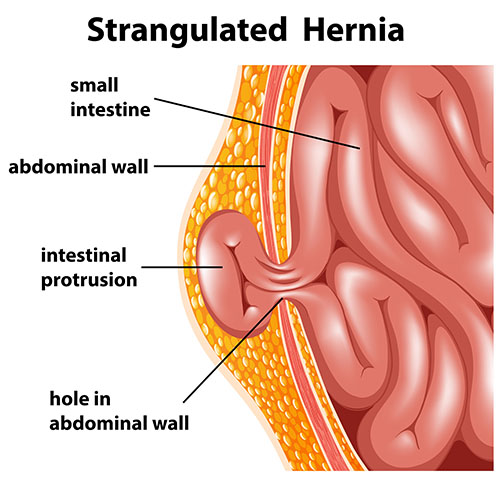
A hernia occurs when an organ protrudes from its original position in the abdomen. A hernia is completely curable using a surgical repair. However, like any other surgery, several complications can occur after a hernia repair surgery. The risk of complications is higher in patients who do not take care of themselves properly during the postoperative period. You should know about the various complications that can occur after hernia surgery.
Table of Contents
Causes of hernia
A hernia mainly occurs because of excessive pressure on the abdominal wall. Primary causes of hernia are-
- Obesity
- Weak muscles
- Smoking
- Pregnancy
- Chronic constipation (Also Read: How Chronic Constipation Affects Your Body?)
- Aging
Symptoms of hernia
Apart from a bulge around the affected area, there are no specific symptoms or signs of a hernia. In case a hernia becomes severe, the symptoms are-
- Severe pain
- A feeling of nausea
- Vomiting
- Unable to push back the bulge into its original place
Treatment for hernia

Doctors recommend several hernia treatment options depending on individual cases, including the location of the hernia. But if there is a risk of strangulation of the organ then doctors suggest surgery. There are two main types of surgical options for hernia:
- Open surgery
- Laparoscopic operation
In open surgical repair, the hernia is closed using sutures, mesh, or both. The surgeon closes the surgical wound either using stitches or staples. The incision is large which requires over a month to heal. It even leaves behind a visible scar.
The success rate of laparoscopic hernia surgeries is higher than other treatment options. Some of the main reasons are discussed below:
- Fewer chances of scarring – In open surgeries, a surgeon needs to make an incision in a patient’s belly that is 6-12 inches long. While in laparoscopic hernia repair, surgeons make small incisions of 0.5-1.5 inches which reduces the chances of visible scars.
- Less pain during the recovery process – After undergoing open surgeries, patients take a longer time to recover as one large incision is made. After laparoscopic hernia surgery, the wound is much smaller and properly bandaged with abdominal sutures. This ensures that the healing is done with the least possible pain. But the pain may arise in very few cases.
- Low risk of bleeding – During laparoscopic surgery, the surgeon makes one or more small incisions in the abdomen. The size of the incision is so small that there is a reduced risk of bleeding. But bleeding might occur if the bandages get loose and the wound is irritated.
- Lower risk of infection – The risk of infection after laparoscopic hernia surgery is significantly negligible as there is minimum exposure of internal organs to external contaminants.
- Outpatient procedures – As laparoscopic surgeries are day-care procedures, patients generally go home the same day of the surgery. Doctors might recommend them to stay for the night to check for any other complications.
- Faster recovery – There are smaller incisions made in laparoscopic hernia surgery, hence the rate of healing is much faster than “open” surgeries.
Complications of hernia surgery

The overall risk of complication after hernia surgery is in the range of 15-28%. The early postoperative complications such as hematoma arise in 8-22% of cases. While urinary retention and wound infection occur in 1-7% of cases.
The incidence of the complication depends on the area and type of hernia and the reason behind the repair.
Like any other surgery, hernia open repair comes with a lot of complications
- Infection of the wound – If you don’t take care of the wound properly, there is a high risk that it may get infected.
- Development of blood clots – Blood clots can occur when you don’t move for a long period of time when you are still under the influence of anesthesia.
- Pain and swelling – In several cases, that area remains sore as you heal. In rare cases, the patient develops chronic, long-lasting pain, especially after inguinal hernia surgery. This may also be the result of damaging nerves during the surgery.
- Recurrence – After the surgery, the hernia can develop near the wound. This percentage can be reduced by half if the surgeon uses mesh.
- Formation of hematoma – This is the collection of blood outside the blood vessels. This happens due to an injury to the blood vessel.
- Retention of the urine – This is the condition in which the bladder does not empty completely.
- Injury to other organs – It occurs in rare cases during hernia surgery.
Conclusion
The rate of complication is much less after a laparoscopic hernia repair than open surgery. State-of-the-art facilities along with advanced equipment help the team of expert doctors to cure the most critical hernias. At Pristyn Care, we use only the latest laparoscopic surgeries for curing the most complicated condition of hernia. Talk to our doctors to know more about hernia repair.
Also Read: What to expect under Hernia Surgery?







